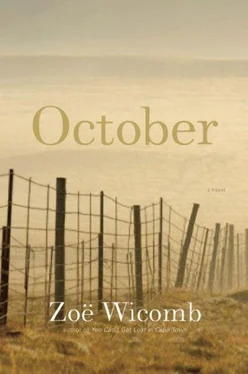Ousie says you have to press on and thank God for small mercies. She says that she too can see goodness deep down in Sylvie’s soul; Ousie knows that in spite of everything Sylvie loves God, that she is grateful for his mercy. Ousie makes Sylvie sit on the floor, clamped between her thighs, as she rubs oil into the girl’s scalp, rubs the excess into the crinkly hair shafts so that they glitter. Then Sylvie’s head leans heavily, drowsily against the soft thigh. Ousie shuts her eyes and, still rubbing, sings in a tremulous voice:
Jesus sal al jou sonde weg was,
jou sonde weg was, jou sonde weg was.
Jesus sal al jou sonde weg was,
as jy kom kniel by die kruis.
Of all the hymns in the book that is the dreariest, can barely be called a tune. But she, Sylvie, has knelt at the cross and in the gloom of the church has seen it surge forward and retreat, in and out of focus, breathing a purple light. The wooden cross studded with amethysts from which light shot in all directions, crisscrossing the ugly altar with shards of purple. Oh, she has seen that purple light before, waiting by the thicket of thorn trees for him to arrive, dressed in sin. As she was, dressed in sin. Sin all bundled up in the heap of garments they shed like snakes so that their bodies shone with purple light. It is a light that AntieMa, Ousie, Nana — her mothers — have never seen, will never see. It is for Sylvie alone. And for the cicadas who came out to line up in the light and screech about God’s love and sin.
Sylvie prefers the English word for SONDE, a neat, stylish word fit for Sundays: SIN. A looser kind of word that could shift back into Sense, Mind, Will. She bows. Ladies and gentlemen, I rest my case. But no, for them, the Afrikaans people, the hotnos, there cannot be a single, lightweight sin. No, always many, always heavy and fixed, always plural, creeping up on a girl, pumping her up with the bad. On days like today when her pool of vygies have burst into full purple flower she has no problem with sly sin. Let it lie in wait for her. God’s sin, which he will not acknowledge as his own. It is the month October. Al die kriekies kriek daar buite, elke sprinkaan spri-ing. The hellfires have been eclipsed by a purple glow, and she, Sylvie, is not afraid.
Ousie says that if she prays for forgiveness she will be spared to grow old and wise, and understand the ways of the Lord. Sylvie lowers her head and nods. They have no idea. Old and wise? No, rather old and ugly with bulging veins of stale blood, and who would wish that? Ousie used to be young and beautiful. Glamorous in her peep-toe shoes as she swung, laughing and light as a feather, from the Bitterfontein train onto that dusty strip where their coach came to a halt. With the cardboard suitcase that the bedding boy, winking, handed down to her. Why had she come back to this?
Ousie is my mamma, the child, Sylvie, once chanted, and AntieMa said, Yes, she is; we are all your mammas. Now Ousie sings dreary hymns, dragging out the O of sonde so that it chokes like so many op-art dresses stuffed down her throat.
It is a shame about Sylvie’s shirt. About the camera having fixed that moment. Not that she thinks the blue-green check does not go well with the jeans, but hooking her left thumb into the jeans pocket and easing her shoulder, the button has come undone and her bra shows. A clean white bra — her breasts, even if she says so herself, have always been lovely — but still, it spoils the pose. She had hoped for something else, something more sophisticated.
The October sun was already fierce, and she called, shouted at Jakkie to fetch her sunglasses in the wooden chest by her bed — there where she keeps the rollers and the hot comb. There’s nothing like a squint to make a girl look as common as a goatherd. Jackie sauntered over from behind the house, distracted, strumming his ramkie fashioned out of a fish-oil tin, and she told him to hurry, hurry otherwise she’d lose the whole damn style. In the meantime, waiting, she wrinkled her nose, snarled, smiled, smoothed back her hair with a limp film star’s hand.
Hurry u-up, she shouted, and it was Kytou who turned up with the glasses, which she had to snatch from him as he tried to balance them on his hotnos nose. Get, she said, voetsek, behind the house with you. This picture that she waves dry, this stylish Kool Kat Girl, is for her and her alone. Never mind about the button that has come undone.
Oom Hansie’s saw moans in tune with the old thorn tree swaying in the wind. Sawing, hammering, nailing. Little tongues of light lap at the shade, at his velskoen, where he saws and hammers under the tree. That’s now Oom Hansie, always by the klein-kraal where Sylvie’s hanslam totters on brand-new sin-free legs, its tail wagging. The picture pulses with the sound of an absent saw.
Later Kytou can have his photo with her, Sylvie, and the lamb. Kytou is okay; he does make her laugh, and she’ll let him wear the sunglasses for their pose.
It was not the job she had dreamt of, but after school, after all the things that happened, that filled their heads and leaked silent poison into the house, there was little else. It was Ousie with her town ways who came up with the plan. Not that anyone asked her, Sylvie; it was just announced, as she sat there cleaning the lamps with newspaper, getting the glass chimneys to shine clear as sunlight.
Sylvie was very, very lucky, they said, and her face fell. Oom Lodewyk would take her on in his butchery. Was she not the one who loved goats and sheep? AntieMa queried. Why then would she not be delighted with the plan? As if dead animals, carcasses, were the same as live ones. But she said nothing. All the things that happened was mos her fault and she should be grateful for something to fill the heaviness of those days, stifling with heat and the deafening shriek of cicadas.
No chance of getting to town, especially now that Ousie had come home. No chance at all. She would have to buckle down to the butchery, besides, there would be some money for herself, and perhaps she could have an account with the new Foschini that had opened in the dorp. Get some fashionable clothes. But AntieMa, by now fat as mutton and barely moving out of her chair, said that a decent girl brings home her wage envelope unopened, that her mothers would give her pocket money. Was there really no way of becoming an adult until you became a mother yourself? Sylvie did not think that she had the makings of a mother, the milky swagger, the whining voice. And who on earth would she team up with to do the mother-thing?
She would not let on to old po-faced Lodewyk that she found the meat cleaver scary. Steady does it, or bone would shatter into vicious splinters. Then it turned out to be not so terrible learning to make boerewors. Better than unpicking hems, lengthening skirts, and squinting over invisible stitching. Handwork, they called it at school. The good, the holy, done by hand alone. Busy hands to keep you out of trouble. Well now, with her hands she’d rather make sausages, boerewors. And what’s more, it may be damp as babies, but she knows which she prefers.
Grind the meat in the big old mincer, add just the right amount of salt, pepper, clove and coriander — although she cannot resist an extra dash of coriander — then leave the mixture overnight in the enamel tubs. No nasty cereals thrown in as they do these days in town, nothing nasty like that pink polony. Sylvie would stand over the tubs where time did not only pass, but slowly, wrapped up in itself and taking its own slithery time, mixed things through, drew the flavors into each other until there could be no telling where one stopped and the other started. It was time that brought something new called boerewors, and there was the wonder of it. That too is how a person gets through. You put up with waiting, with thinking of time working its miracle, changing one thing into another, even when your hands are tied behind your back, and when your mothers stand over you with three sets of eyes.
Читать дальше












